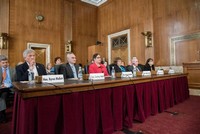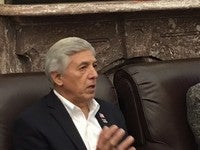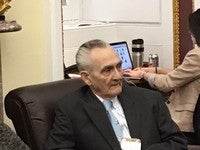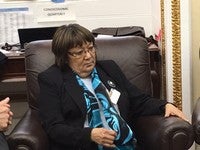News
Witnesses Provide Compelling Testimony on King Cove Road Issue during Congressional Hearing
April 14, 2016
Congressional Hearing

Washington, D.C. – Alaska’s Lieutenant Governor; a retired Coast Guard commander; and a representative from the National Congress of American Indians were among the witnesses who testified today during an emotional congressional hearing focusing on a life-saving road in King Cove, Alaska. Senator Lisa Murkowski, Chair of the U.S. Committee on Energy and Natural Resources, conducted the oversight hearing highlighting the continuing lack of dependable emergency medical transportation in the remote, mostly-Native community.
“Over the past three decades, scores of King Cove residents have been medically evacuated from King Cove to the nearby community of Cold Bay and, regrettably, more than a dozen individuals have passed away – either due to weather-related aircraft accidents or the inability to obtain timely medical treatment,” Lieutenant Governor Byron Mallott said.
Retired Coast Guard Commander John Whiddon testified about recovering the bodies of four people who died in a 1980 plane crash about 8 miles south of Cold Bay during a medevac from King Cove. It’s a memory that still haunts him today.
“The trooper directed us to remove the bodies,” Whiddon said. “I recall later looking back from the cockpit – a memory that has lasted 37 years. In hindsight, this could have been avoided if there had been ground transportation between King Cove and Cold Bay. In addition to the loss of lives, the two helo crews and a C-130 crew“We need to recognize that we (the people) are as important on this land as anything else,” Alaska Lt. Governor Byron Mallott said during his testimony.were put at risk as they flew many hours in heavy snow and high winds to locate the crash site and recover the bodies.”
King Cove (Native) Corporation spokeswoman Della Trumble said she knows residents are living on borrowed time with their transportation access problem. Six years ago, she witnessed her daughter’s plane crash. Fortunately, there were no serious injuries.
“No mother should ever have to witness their own precious daughter crash land at the King Cove Airstrip due to our highly unpredictable turbulence and downdrafts from the volcanic mountainous terrain that surrounds the narrow valley where our 3,000’ gravel runway is located,” Trumble said. “It was the scariest few minutes of my life as I sat there watching the plane be pushed downward by the wind when it crash landed on the runway without its landing gear down.”
National Congress of American Indians Policy Director Denise Desiderio said this is first and foremost an issue of public safety. NCAI passed resolutions of support for King Cove’s road access in 2007, 2014 and again in 2015.
“Access to emergency medical assistance is one of the most basic rights afforded to American citizens,” she said. “Nowhere is this more relevant than in American Indian and Alaska Native communities who ceded millions of acres of land to form the United States. In exchange, Native communities expect the United States to uphold its federal trust responsibility in areas such as education, land management and health“In hindsight, this could have been avoided if there had been ground transportation between King Cove and Cold Bay,” said retired U.S. Coast Guard Commander John Whiddon. Whiddon assisted in the recovery of four bodies from a 1980 plane crash that occurred during a medevac.care. NCAI’s members have shown consistent and long-standing support for road access to King Cove.”
In 2013, U.S. Secretary of the Interior Sally Jewell rejected a small gravel road that would have linked the Native community to the nearby Cold Bay airport through the Izembek National Wildlife Refuge. Jewell claimed the road would have caused irreversible damage to the Refuge and to the wildlife that depend upon it.
“Unfortunately, as you know, the Fish and Wildlife Service concluded in the Record of Decision that a road is not an appropriate option,” Mallott said. “Specifically, they noted their concern that a road through the Izembek National Wildlife Refuge would be disruptive to wildlife, particularly the black brant species of goose. This is rather ironic, as the Izembek National Wildlife Refuge’s own website promotes hunting of various waterfowl, including the black brant. One hunter may take home up to two black brant per day during the hunting season.”
Aleutians East Borough Mayor Stanley Mack said marine alternatives suggested by Jewell and other critics in the past are simply not reliable or viable. In the past, injured or seriously-ill residents have been medevaced by boat when air travel was impossible because of severe weather.
“Strapping injured or sick patients into a gurney and hoisting them up from the deck of a boat, which can be as much as 20-25 feet below the Cold Bay dock, is always a scary situation,” Mack said. “PuttingAleutians East Borough Mayor Stanley Mack said marine alternatives suggested by U.S. Interior Secretary Sally Jewell and other critics are simply not reliable or viable.elders inside a crab pot and using a crane to hoist them up to the top of the dock is frightening. Most people do not realize that both high winds and ice can prevent us from using boats as large as 125’ from accessing the Cold Bay dock that extends out from shore a quarter of a mile. The trauma and high risk that these marine medevacs require is very frightening to all of us.”

Mack said the proposed road is the most logical, safe and affordable alternative.
“I respectfully ask all committee members to support Senator Murkowski’s efforts to authorize this road, which would significantly enhance the quality of our lives,” Mack said. “Our lives do matter.”

Since U.S. Interior Secretary Sally Jewell denied the road on Dec. 23, 2013, there have been a total of 42 medevacs. Of those, 16 involved the Coast Guard and 26 were non-Coast Guard medevacs.

Background
The people of King Cove have worked for more than three decades to build a life-saving road corridor linking their isolated community to the all-weather Cold Bay Airport, 25 miles away. The small stretch of road (approximately 11 miles) would connect to existing roads in the Izembek National Wildlife Refuge and would provide reliable and safe ground transportation to medevac seriously ill or injured patients when travel by plane or boat is too“No mother should ever have to witness her own precious daughter crash land at the King Cove airstrip,” said Della Trumble, spokeswoman for the King Cove Corporation and member of the Agdaagux Tribe. “It was the scariest few minutes of my life.”dangerous due to the area’s frequent periods of harsh weather.

In 2009, Congress and the President approved the road and a massive land swap (61,000 acres from the State and the King Cove Corporation) in exchange for a small, 206-acre, single-lane gravel road corridor. However, the deal was blocked by U.S. Interior Secretary Sally Jewell, who issued an order rejecting the road and land exchange just two days before Christmas 2013.
On June 4, 2014, King Cove tribes, the corporation, the city and the Aleutians East Borough (the King Cove Group) sued Secretary Jewell and other federal officials over the rejection of the road. In June 2015, the Senate Appropriations Subcommittee on Interior, Environment and Related Agencies approved legislative language by Sen. Lisa Murkowski, R-Alaska, directing the Interior Department to do an equal-value land transfer to allow the construction of the connector road. Unfortunately, the language was not included in the final year-end budget deal.
On Sept. 8, 2015, U.S. District Court Judge Holland ruled against the King Cove Group and determined there was no violation of the National Environmental Policy Act (NEPA) or of the Omnibus Public Lands Management Act (OPLMA). The judge acknowledged that Secretary Jewell based her decision solely on the environmental impacts of the road and ignored the public health and safety impacts. The residents of King Cove continue to fight for life-saving ground access road to the all-weather Cold Bay Airport.